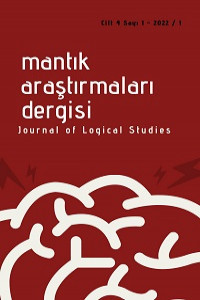Category Discussions from Ancient Philosophical and Logical Approaches to the Present: The History of Argumentation Studies and Three Different Types of Argumentation in Aristotelian Philosophy
When we investigate the history of philosophy from Heraclitus to Aristotle, we see that almost each philosopher in this process has tried to explain (or define) what being, non-being, motion, truth, knowledge, value and so on are. Undoubtedly, the inquiries here are directly related to determine the categories of these mentioned things. As is known, categorization process is a structural activity that shapes all human cognitive processes in terms of classifying not only physical objects but also mental states and abstract ideas. This means that perception, thinking, learning, explaining and making sense of the objects and properties in the external world become possible only through categorization. We claim that the mentioned ancient philosophical discussions on categorization issue historically form the basis of argumentation studies. That Aristotle who’s been influenced by previous philosophical discussions has systematically structured argumentation studies through his theory of categories makes this clear. That Aristotle and some Aristotelian philosophers consider arguments not only as demonstrative (apodeictic) arguments but also dialectical and rhetorical arguments show that argumentation studies have a wide range of application, namely it should not be limited to just demonstrative or rhetorical arguments.
Anahtar Kelimeler:
category, argument, demonstration, dialectic
___
- A. H. Coxon, The Fragments of Parmenides, Parmenides Publishing, Las Vegas, 2009.
- Al-Fârâbî, Book of Rhetoric (Transl. Lahcen E. Ezzaher), Rhetorica: A Journal of the History of Rhetoric, Vol. 26, No. 4 (Autumn 2008).
- Al-Fârâbî, el-Fusûlü’l-Hamse (Tahk. ve Takd. Refîk el-‘Acem, el-Mantık ‘ınde’l-Fârâbî I) Dâru’l-Meşrik, Beyrût, 1985.
- Al-Fârâbî, Felsefetü Aristûtâlîs (Tahk. ve Takd. Muhsin Mehdî) Dâr Mecelletü Şi‘r, Beyrût, 1961.
- Al-Fârâbî, Kitâb al-Burhân (Ed. Mâcid Fahrî, al-Mantıq ‘ınd al-Fârâbî, Dâr al-Mashriq, Beirut, 1987.
- Al-Fârâbî, Kitâbu Îsâğûcî ey el-Medhal, (Tahk. Ve Takd. Refîk el ‘Acem, el-Mantık ‘ınde’l-Fârâbî I) Dâru’l-Meşrik, Beyrût, 1985.
- Appleton, R. B., The Elements of Greek Philosophy – From Thales to Aristotle, Methuen, London, 1922.
- Aristotle, De Interpretatione (In, Categories and De Interpretatione, Transl. J. L. Ackrill), Clarendon Press, Oxford, 2002.
- Aristotle, Metaphysics (Transl. W. D. Ross), Princeton University Press, Princeton, 1991.
- Aristotle, Posterior Analytics (Transl. Jonathan Barnes), Princeton University Press, Princeton, 1991.
- Aristotle, Prior Analytics (Transl. A. J. Jenkinson), Princeton University Press, Princeton, 1991.
- Aristotle, Rhetoric (Transl. W. Rhys Roberts), Princeton University Press, Princeton, 1991.
- Aristotle, Sophistical Refutations (Transl. W. A. Pickard), Princeton University Press, Princeton, 1991.
- Aristotle, Topics (Transl. W. A. Pickard), Princeton University Press, Princeton, 1991.
- Charles H. Kahn, The Art and Thought of Heraclitus, Cambridge University Press, Cambridge, 2001.
- Christopher W. Tindale, Reason’s Dark Champions, The University of South Carolina Press, Columbia, 2010.
- Deborah K. W. Modrak, Aristotle’s Theory of Language and Meaning, Cambridge University Press, Cambridge, 2003.
- Deborah L. Black, “The Logical Dimensions of Rhetoric and Poetics: Aspects of Non-Demonstrative Reasoning in Medieval Arabic Philosophy” (PhD Thesis), University Of Toronto, Toronto, 1987.
- E. Schiappa, Defining Reality, Southern Illinois University Press, Carbondale and Edwardsville, 2003.
- Francis MacDonald Cornford, Plato and Parmenides, Routledge and Kegan Paul Ltd., London, 1958.
- Franz Brentano, On the Several Senses of Being in Aristotle (Transl. Rolf George), University of California Press, Berkeley, 1975.
- G. S. Kirk et. al, The Presocratic Philosophers, Cambridge University Press, New York, 2005.
- G. S. Kirk, Heraklitus: The Cosmic Fragments, Cambridge University Press, New York, 1975.
- Ibn Bâcca, Ta‘âlîku ibn Bâcca ‘alâ kitâb al-burhân, ed. Mâcid Fahrî, al-Mantıq ‘ınd al-Fârâbî, Dâr al-Mashriq, Beirut, 1987.
- Jonathan Barnes, The Presocratic Philosophers, Routledge, London and New York, 2005.
- Michael D. Bakaoukas, “Nonexistence – A Comparative-Historical Analysis of the Problem of Nonbeing”, E-Logos, 4/2014.
- Paul Seligman, Being and Not-Being – An Introduction to Plato’s Sophist, Martinus Nijhoff, The Hague, 1974.
- Plato, Phaidros, (In, Euthyphro, Apology, Crito, Phaedo, Phaedrus; Transl. Harold North Fowler), Harvard University Press, Cambridge, 2005.
- Plato, Sophist (In, Theaetetus and Sophist, Ed. and Transl. Christopher Rowe), Cambridge University Press, Cambridge, 2015.
- R. M. Van Den Berg, Proclus’ Commentary on The Cratylus, Brill, Leiden, 2008.
- Raoul Mortley, The Rise and Fall of Logos, Hanstein, Bonn, 1986.
- Robert Adamson, A Short History of Logic, William Blacwood and Sons, Edinburgh, undated.
- Sextus Empiricus, Against the Logicians (Transl. Richard Bett), Cambridge University Press, Cambridge, 2005.
- ISSN: 2687-3125
- Yayın Aralığı: Yılda 2 Sayı
- Başlangıç: 2019
- Yayıncı: Ahmet KAYACIK
